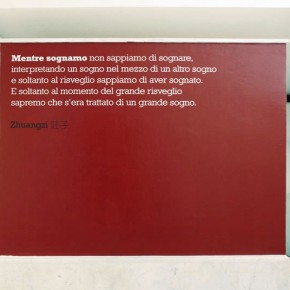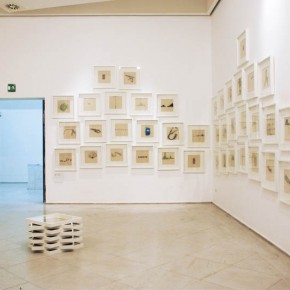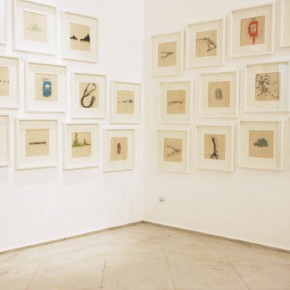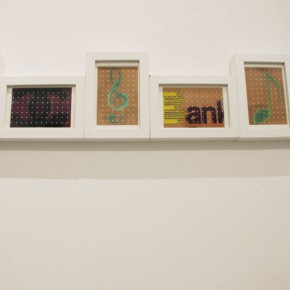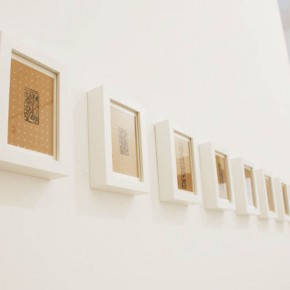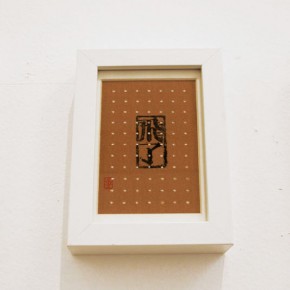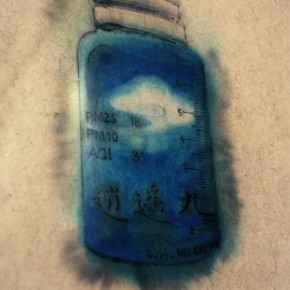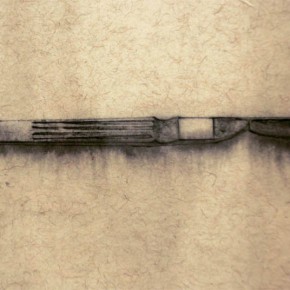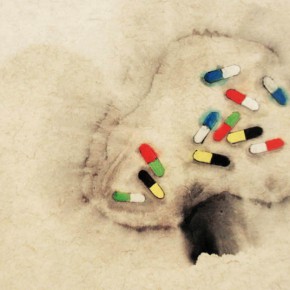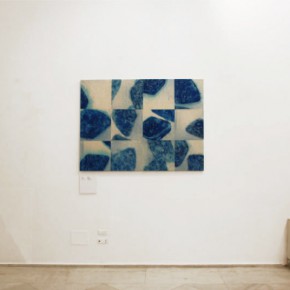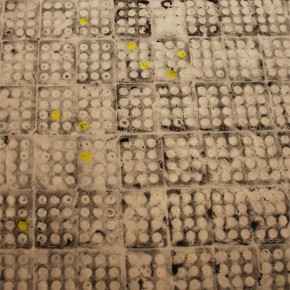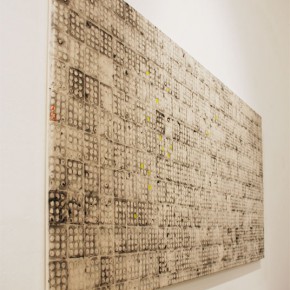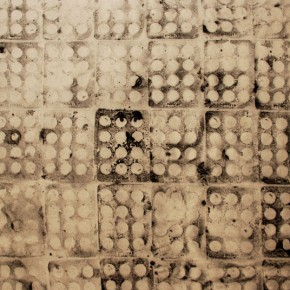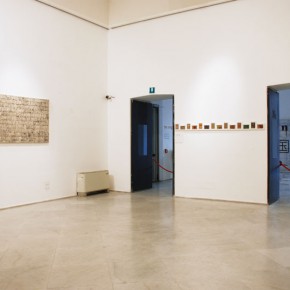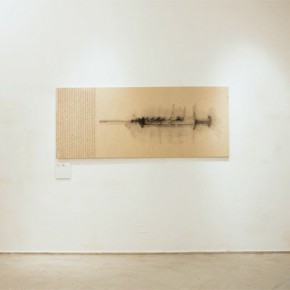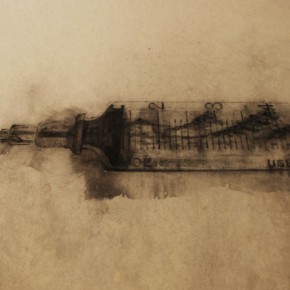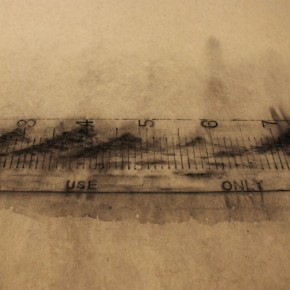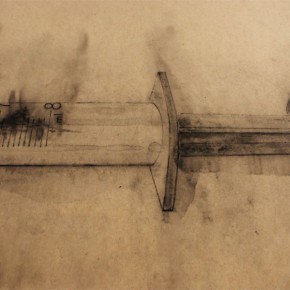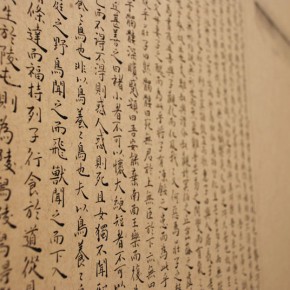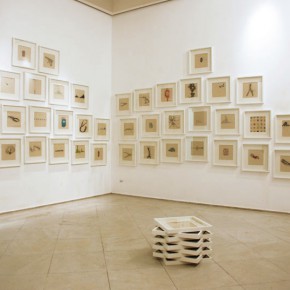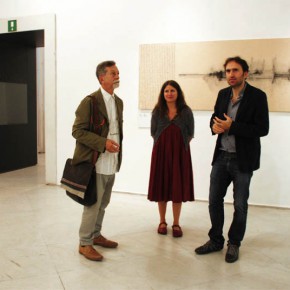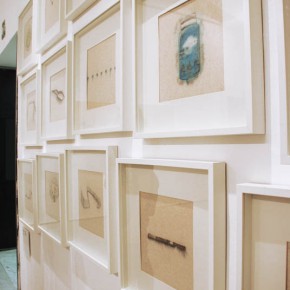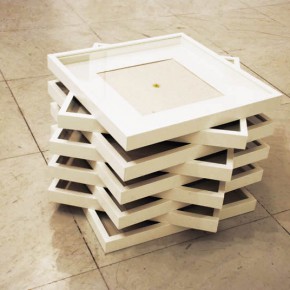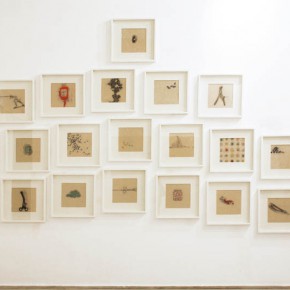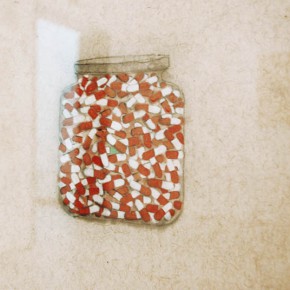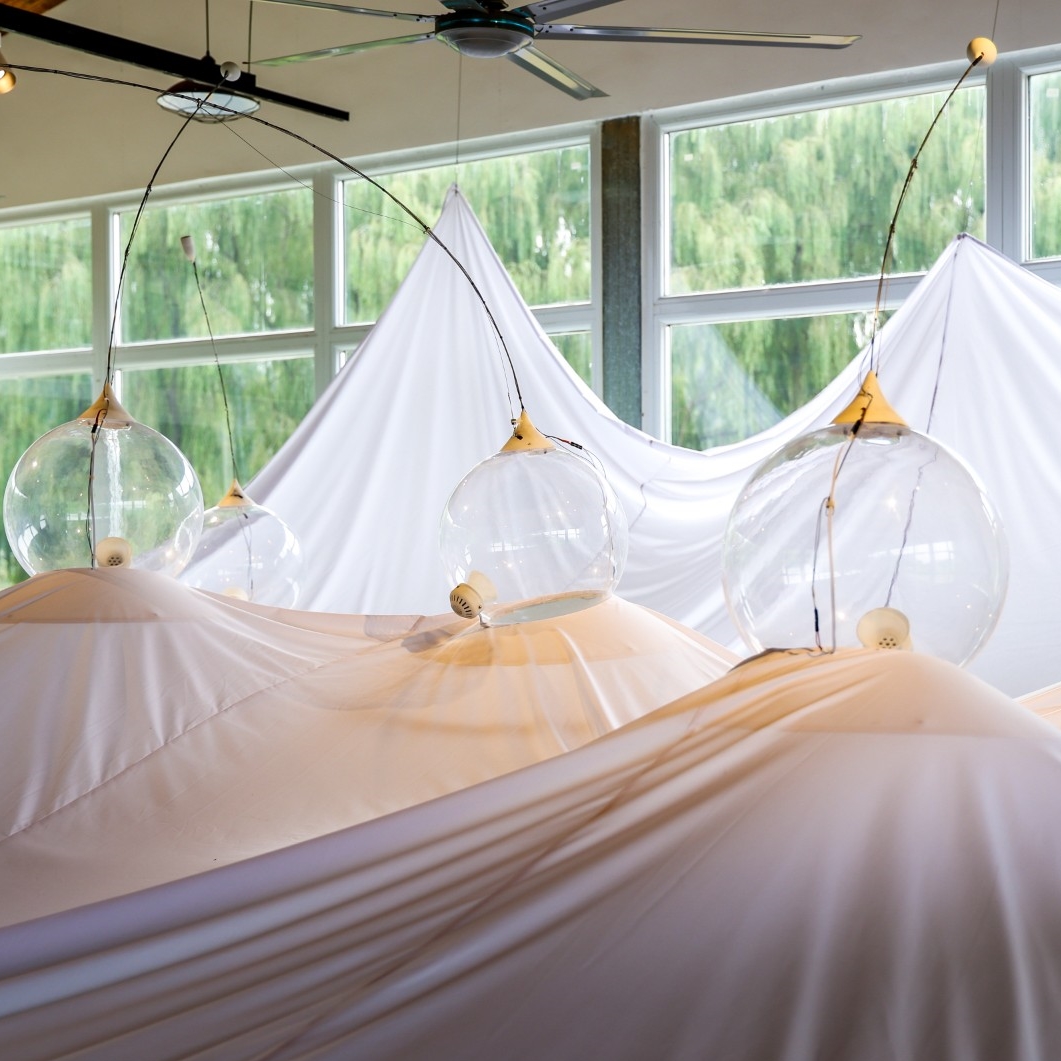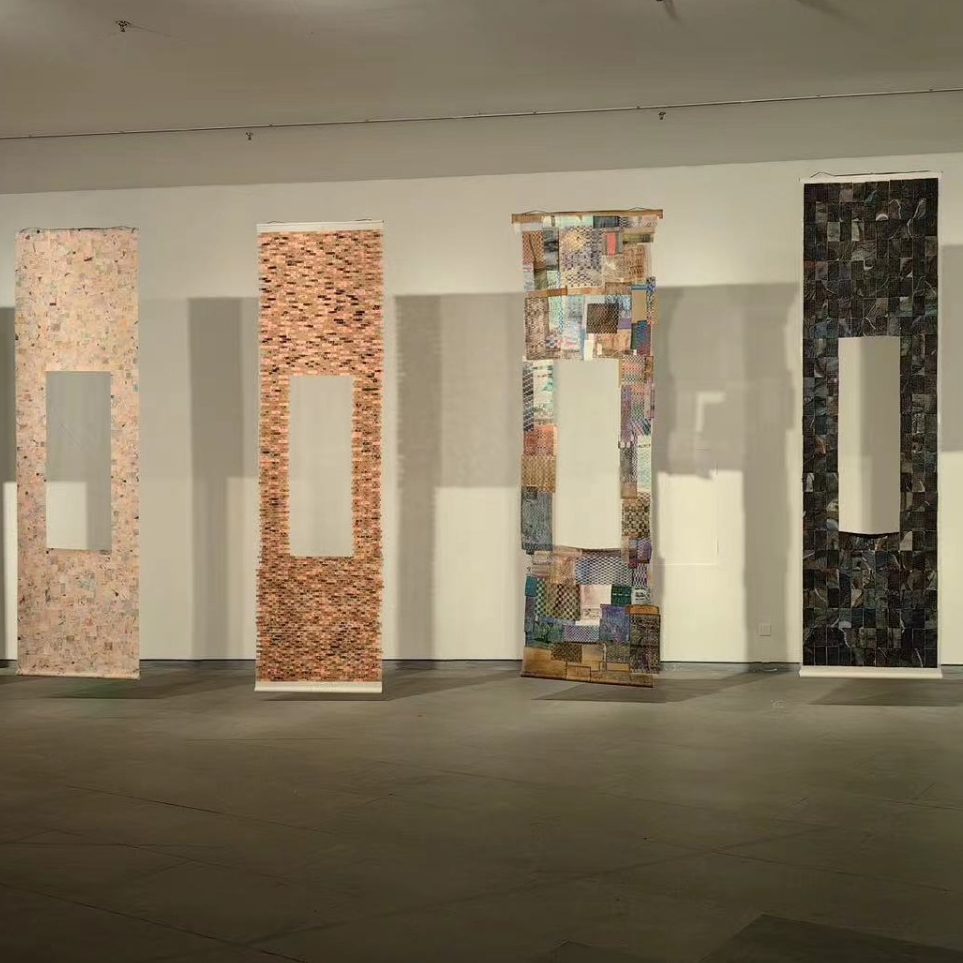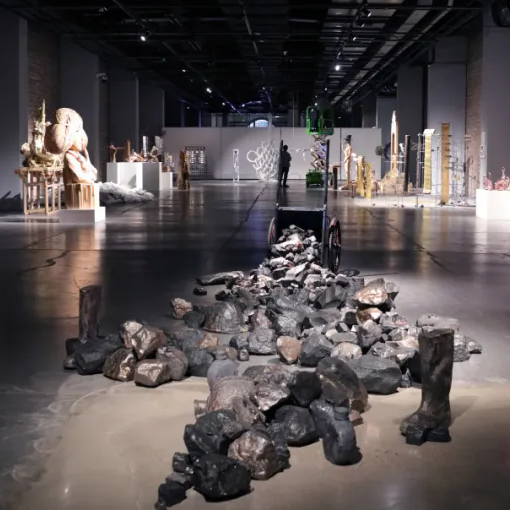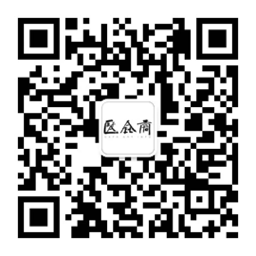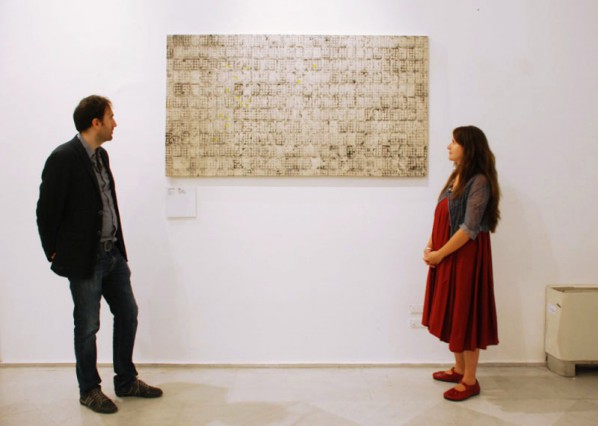
To organize an innovative exhibition of contemporary Chinese art means to execute new curatorial strategies capable of giving visibility to those more authentically Chinese artistic productions, who carry on the tradition of ink painting and hardly find a place within conventional art shows. “The Remedy” exhibition set itself the target of offering a new perspective about the Chinese contemporary painting practice and intend to draw Italian audience‘s attention to a different mode of expression of an extremely diversified and stratified artistic phenomenon whose complexity hardly emerges out of the usual curatorial choices.
The exhibition presents, for the first time in Italy, the paintings of “Registration” (2012-) series and brings together all that works that better reflect the artist’s ability to modernize the visual language of Chinese ink painting, proposing an artistic genre that is traditional in terms of painting media and modern for the contents. The singular choice of atypical pictorial subjects such as needles, pills, tonics and surgical instruments creates a strong dissonance between the suggestions evoked by images that allude to an idea of pain and suffering, and the usual sublimation of reality proposed by ink painting. Without getting lost inside dark labyrinths of meaning, Zhang Yanzi’s paintings record with empathy and awareness individual and collective moods. All her works, typified by a deep social and cultural value, never appear vulgar or redundant and tell us something about the pursuit of a remedy, a cure for the widespread uneasiness running through Chinese contemporaneity.
[Elena Macrì]
“Registration” (2012-) Zhang Yanzi’s series is a fundamental art project not merely because it marks a caesura in respect to the previous and/or coeval creation of the artist, but especially because it establishes a new iconographic preceding in the Chinese tradition of ink and wash: “ … in terms of her surprising theme, it is unprecedentedly a new philosophy from the encyclopaedic history of Ink and Wash” (Xu Lei).
At beginning “Registration” emerges similar to an ongoing “register” of objects related to the field of modern medicine, of which the artist wants to pictorially represent the purpose and mainly evoke the damaging effects of those. In every watercolor of the series, the many figures of drugs, of surgical instruments and of dressings, which are painted with a rilievo and surrounded by halo, get centrally positioned on a juta paper support, which, in conformity with its properties, allude to the humane epidermis; therefore they slightly appear to protrude towards the space of the spectator, inciting him to a very close and synesthetic perception and, in turn, to an intense and deep emotional involvement.
This reception, oscillating between proximity and distance, visuality and tactility, impassivity and sensitivity, drags the observer in an ambivalent and irresolute frame of mind, suspended between threat and reassurance, trust and suspicion that allegorically recalls to him the dilemma about the reversibility between the remedy and the disease, the pain and the joy: “Aches, physical or psychological / From the moment we were born, they will accompany us to our death / Our happiness is equal to pain/ … ” (Zhang Yanzi, “The Remedy”, June 25, 2013). Yanzi feels on her own skin and inside her own spirit the urgency to meditate and to invite us to meditate upon the eternal issue concerning the remedy for the physical pain and the psychic suffering; and, at the same time, she satisfies our ancestral need to try a cathartic aesthetic experience that purifying us from bad moods and underlying worries, it could offer to us a precious relief.
[Domenico Esposito]About the artist
Zhang Yanzi was born in Zhenjiang, Jiangsu Province. She is currently based in Beijing. Zhang got her MFA in both the Chinese Painting Department at China Central Academy of Fine Arts and Beijing Normal University. She serves as the Editor-in-chief of CAFA ART INFO.
Awards and Selected Exhibitions:
Basel HongKong (2014); The Remedy was awarded the Best Artwork of 2013 Lu Xun Culture Awards (2013); The Remedy, solo show at Today Art Museum (2013); Qi (Flow of Energy) included in The Grand Canal: Collateral Event of the 55th International Art Exhibition - La Biennale di Venezia(2013); Registration included in Recurrence of Ink and Wash: 2000-2012 Chinese Contemporary Ink and Wash Invitation Exhibition (2012); Refreshing Breeze included in Self Image: Woman Art in China (1920-2010), Central Academy of Fine Arts Museum (2010).
About the curators
Domenico Esposito (1974) is an art critic and independent art curator based in Italy. He holds a M.A. in Aesthetics from the University of Bologna.His research interests focus primarily on the identity and interpretation of art and on the relationship between ethics and artistic experimentation. He is contributor of the contemporary art magazine "D'ARS" and of the Italian review of aesthetics “Parol”.
His publications include: “(Po)etica del museocontemporaneosperimentale” (2010) / “(Po)etics of the experimental contemporary museum”; “Il museodemuseficato – parte I (2011) e parte 2 (2012)“ / “The Demuseification of the museum – part I and part 2”; “Doris Salcedo: PlegariaMuda” (2012)”; “NanniMenetti: l’artista non ha maiavutomani” (2013) / “NanniMenetti: the artist has never had hands”.
On the topic of the relation between ethics and art museums in postmodern era he has conceived and curated the conferences series “PoEtiche del museod’artecontemporanea” (2011) / “PoEthics of the museum of contemporary art”. He has curated group and personal exhibitions for public institutions and no profit organizations, among them are: “Oltre la paralisi” (2012) / “Beyond Paralysis”; “Video al terminedellanotte” (2012) / “Videos to the End of the Night”; “Framing the rebel” (2013) and the first Italian solo exhibition of Zhang Yanzi “The Remedy” (2014).
Elena Macrì (1981) is currently an independent researcher. She holds a M.A. in Chinese Studies and a Ph.D. in Chinese Art History from the University of Naples “L’Orientale”. She is member of AISC (Italian Association of Chinese Studies) and regularly attends conferences, seminars and lectures on Chinese modern and contemporary art. Previously, she has studied and conducted research on Chinese painting at the University of Leiden, the China Academy of Art of Hangzhou and the Nanjing University of the Arts. Recently, she has curated the solo exhibition of Zhang Yanzi “The Remedy” (Napoli, PAN, 2014).
Her research focuses on Chinese modern and contemporary ink painting, with special attention to the history of landscape painting. Research project examines how the theoretical and pictorial repertoire of landscape painting has evolved in modern China since the beginning of the twentieth century and analyzes the complex factors that led this genre moved well beyond the conventions of traditional literati painting. The study also explores the interaction and stylistic contamination between traditional and modern visual languages, highlighting how the relationship between image, depiction and creativity has deeply changed in this artistic genre. She has published some academic papers on this topic: “Il fenomeno dell’interazione (ronghe 融合). Tradizione e innovazione nel linguaggio visivo della pittura cinese moderna” (The phenomenon of artistic interaction (ronghe 融合). Tradition and innovation in the visual language of modern Chinese painting); “Giocare con i codici. I paesaggi di Lin Fengmian tra tradizione e modernità” (Playing with codes. The landscape painting of Lin Fengmian between tradition and modernity); “Beyond tradition. The practice of artistic interaction and its effect on modern Chinese landscape painting”. Her research interests also include Chinese art theory, Chinese ink painting theory and practice, Chinese aesthetics, Chinese visual culture.
About the exhibition
Duration: October 21st – 26th, 2014
Curators: Elena Macrì and Domenico Esposito
Co-curator: Xu Lili
Vernissage: Tuesday, October 21st – 12:00
Venue: PAN - Palazzo delle Arti Napoli
Address: Via dei Mille, 60, 80121, Naples, Italy
Hours: 9.30 - 19.30; Sunday 9.30 - 14.30
Free admission
T.:+39 0816909354
E-mail: confucio@unior.it
Web: www.confucio.unior.it
Photo Courtesy: Racna Magazine – http://www.racnamagazine.it/
Photo: Anna Maria Saviano


